Erstellt am: 2. 6. 2016 - 19:03 Uhr
The Trauma of Kunduz
The medical aid organisation Médecins Sans Frontières opened its trauma hospital in Kunduz in northern Afghanistan in August 2011. Equipped with an emergency room, two operating theatres, and an intensive care ward, as well as X-ray and laboratory facilities, it was the only facility of its kind in that region of the war-torn country.
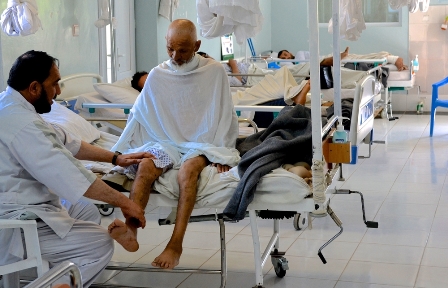
MSF Michael Goldfarb
In the early hours of 3rd October 2015, the Kunduz Trauma Centre was destroyed in an airstrike by a United States Air Force AC-130U gunship.
At least 42 people were killed in the attack, 14 of whom were MSF hospital staff. Dozens of others were wounded.
In April the United States military released its report on the attack, but MSF has reiterated its call for an “independent and impartial investigation” into how a hospital, which should be protected under international law, came to be a target.
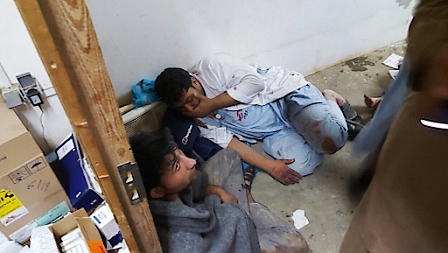
MSF
Meanwhile, the surviving doctors and staff of the Kunduz hospital are trying to recover from the trauma of what happened eight months ago. One of the people trying to help is Sylvia Wamser, is a psychologist and psychotherapist who has been in Kunduz working with the MSF staff.
Reality Check spoke to Sylvia Wamser about her work in Kunduz:
Dieses Element ist nicht mehr verfügbar
What were your experiences and impressions when you first arrived in Kunduz?
The first experience of seeing the totally devastated building was already suffocating in a way. We tried to set up groups to start with what we call pycho-education to explain to people what the signs and symptoms after a life-threatening event can be, the kind of reactions people can have and that this is normal after an abnormal event, that it can occur some time later, up to six months. Already during these groups people would come up and share their experiences, saying “yes, I feel sleeplessness”; “I have problems eating”; “I’m hypervigilant, when I hear the clicking of the door knob or when the kids come into the room I’m startled”. So it was very good to actually help people to share and to encourage one another that what they’re experiencing is normal in abnormal circumstances.
Can you give me an idea of the staff members you were actually talking to?
From previous experience we decided to group them according to their position more or less. In a country like Afghanistan you could never put doctors with guards in one group, this would not really match very well. So we had a group of guards and drivers, who are let’s say on the lower range of the pay roll, and sometimes may not even be able to read and write. Then we had groups from the administration, groups from the technical services like water and sanitation, or carpentry and technical repairs, electricians. And then we had the medical staff – nurses, pharmacists and doctors.
To what extent is recovering from a traumatic experience like that talking about what actually happened – is that something people can talk about, is it something they want to talk about?
I would say there is a lot of discussion about this. I prefer to focus people on positive goals on: What is it that you would like to do in the future? What is it that you see yourself doing in the future? Because for many people there is the danger of re-traumatising them, especially if you kind of force them to talk about what happened.
If it happens naturally … I remember one of the administration people [who described how] he was actually driving the ambulance, trying to relocate wounded people from the MSF hospital to another hospital. First there was the trouble of finding the keys, of starting the car, of getting the people in, and as soon as they were out of the compound they were shot at.
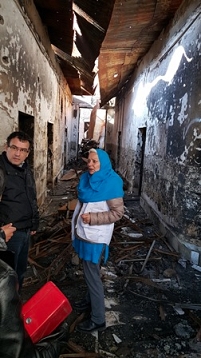
MSF
He was telling his experience to many, many people and it seemed like it was really very important for him, but for other people it depends really on the personality and I think you have to judge from case to case. My goal is more the positive orientation to say: What is there that can help you feel better? What can you do to feel better? What are your resources? What have you done in the past to overcome a negative experience?
You have to remember that Afghanistan is not a peaceful country and has not been in the past, and many people have had life-threatening experiences before. I remember one of our doctors who first said “I’m fine, I have no problems, I manage to do life-saving surgery”. But all the others said he was behaving kind of strange and differently. Finally I managed to talk to him and we tried to find some resources for him from the past. Then he opened up and he said “my father was killed when I was three years old, my mother remarried so I had a stepfather and step sisters and brothers, the financial situation of the family was not good and when I grew up I was herding sheep. But I was always walking with a Kalashnikov, I’m not afraid to shoot, I know how to shoot”.
So this is just to show that the people there are very resilient, and they have had bad experiences before. But they have never been in a situation where they believed “we are safe here, nothing can happen to us, because we are actually treating wounded people from all the parties, as well as civilians.
This is the crucial point, isn’t it, because a hospital should be protected by international conventions. So what does that do to people’s trust when something like this happens?
Their trust was absolutely shattered. They were confused, they were angry. Some of them would become depressed, or paralysed, but it’s something I think you can really only understand when you talk to the people there.
Kunduz Trauma Centre was one of two centres in all of Afghanistan where they were treating wounded people at a very high standard of medical care. Those people were very proud to be part of this team of over 400 people. They thought: yes, it happens maybe somewhere else that there are attacks, that there are roadside bombs, but it would never happen here.
People were encouraged, even those who were not on duty, to stay in the hospital, in the bunker, because it was safe. It was the only place that was lit, that had electricity. So it’s really complete deception, complete shock, disbelief.
The two operation theatres were functioning in the early morning hours, people were operating on patients, no nobody ever dreamed that this would be possible.
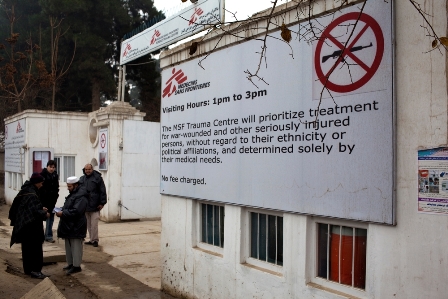
MSF Michael Goldfarb
What can you tell us then from what you heard about the scenes that played out that night in the hospital when it was hit?
They were working, they were operating until they realised that there’s actually airstrikes going on. Until they realised: we cannot save our patients who were under anaesthesia – you cannot take an anaesthetised patient from the table. It took quite some time and the majority of people were actually in the basement, but those who were working really needed some time to understand what is going on that they had to desert their patients to save their own lives.
That in itself must be quite traumatic for a doctor or a nurse…
Definitely! And the second thing that was very traumatic for the doctors there was trying to save their own colleagues’ lives. One of them was bleeding basically to death, they were trying to find a matching blood group, they had found someone to perform a transfusion but they could not perform it (in a makeshift theatre set up in a kitchen) because the blood bags had been burned during the attack. So you have this big stress of deciding whether to leave your patient on the table to save your own life, and also maybe not being able to save the life of your own colleague who was maybe your best friend.
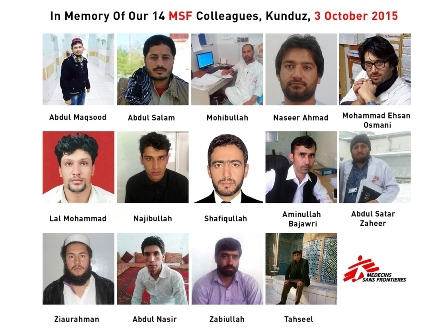
MSF Michael Goldfarb
One of them had his brother dying in his arms, he’s still very, very traumatised. It was like a carnage. It was so unreal for people. And on top of everything people were taking videos with smartphones of the makeshift surgery they were doing. And they were actually sharing these videos, looking at these videos, which is another source of being re-traumatised. It’s not only the flashback which comes into your mind on an uncontrolled basis, but it’s actually seeing the video.
Is it possible to recover, emotionally and psychologically, from something like this, and to get back to what one might call normality?
My personal opinion – not everyone might agree with me – is that you can recover. One of the important points is to start the intervention as early as possible. And it’s also the possibility of being able to get back to normal – going back to a normal routine, going back to work, being able to do your job, to get your satisfaction through your job. This is one of the crucial things we have not reached yet.
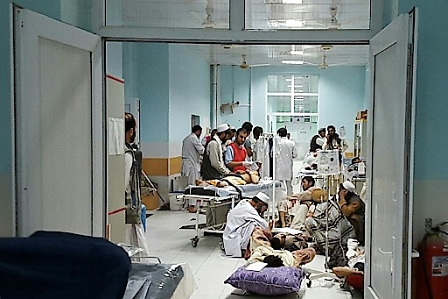
MSF
The incident happened in October, and the people there are still waiting for the news: will we be able to start our work again or not? People are all under contract, some of them are going to work, but some of them of course have no work to do. There is one very, very smart technician who is very depressive, who complains about concentration problems. We managed to move him to another project where he can actually exercise his creativity. If there is nothing you can do, no new ideas, no new things to produce, to develop, there is a danger of getting depressed, like many jobless people get depressed.
So getting back to a daily routine is very important …
Very important, and also the security of having your job in the future. Many people are the sole family supporters, they have maybe 8 family members to support, and not knowning – will I have a job next month, or the month after? – is also a big handicap to recovery.
Basically, yes, I think people recover. They have recovered from previous life-threatening situaitons. I remember one of our staff who was working for an American organisation before he joined MSF. He was in the position of a guard, sitting behind the big entrance gate. There was a car bomb that exploded in front of the gate and he was severely injured by pieces of concrete and metal. He took a long time to recover and you can still see the scars in his face. When he was trying to flee during the October attack he said he ran faster than he had ever run before, so fast that the detonations happened a short way. After three detonations he said he lost his vest with his phone in, and then he was no longer followed by shootings.
If you imagine that this is happening to you after you had another life-threatening event before, it’s understandable that this can have a very traumatising effect. But he’s getting better now, he’s able to concentrate, he’s studying – I think law – and he passed one of his exams. This is the good news and this is the positive side to see that people can recover.
MSF wants a full enquiry into what happened in Kunduz. Is that something which is symbolically and psychologically important for those affected by it?
I remember there was a big white board and there was a question mark on it, and then they wrote: Why? I feel for them it is very important to understand why and how it happened, in order to continue to work and live there.
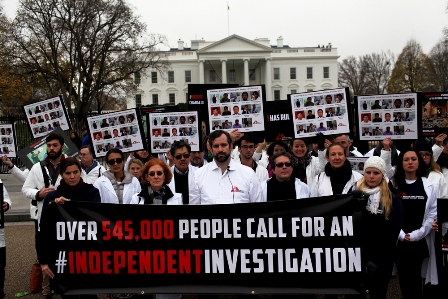
MSF Michael Goldfarb


